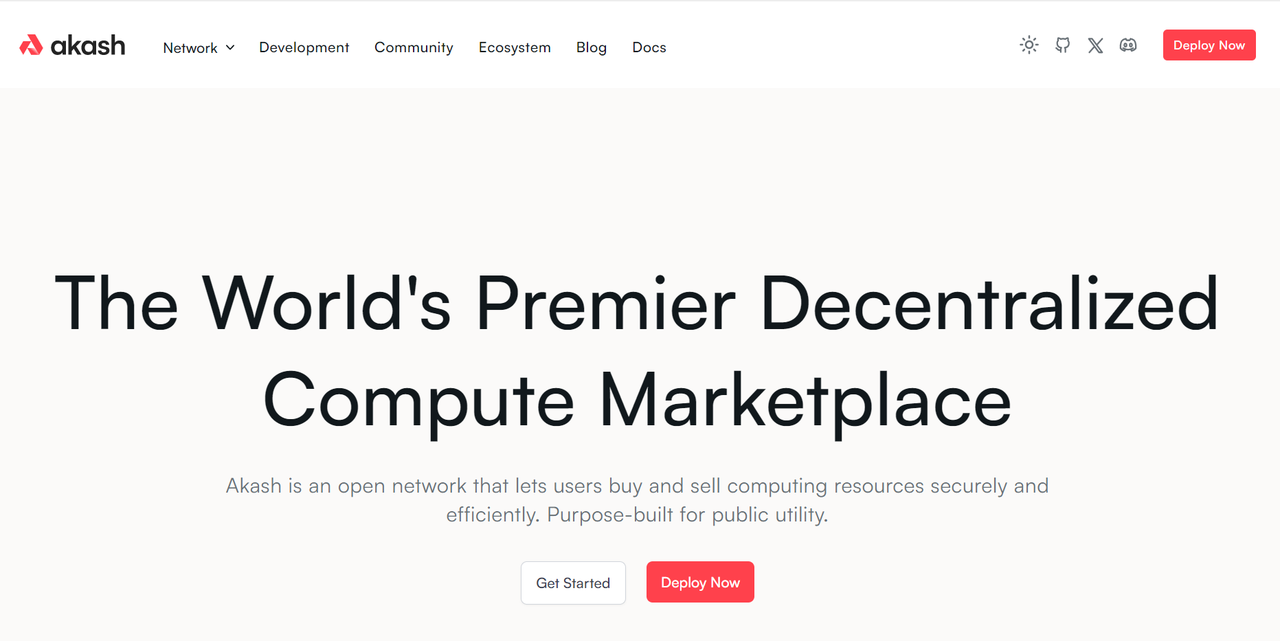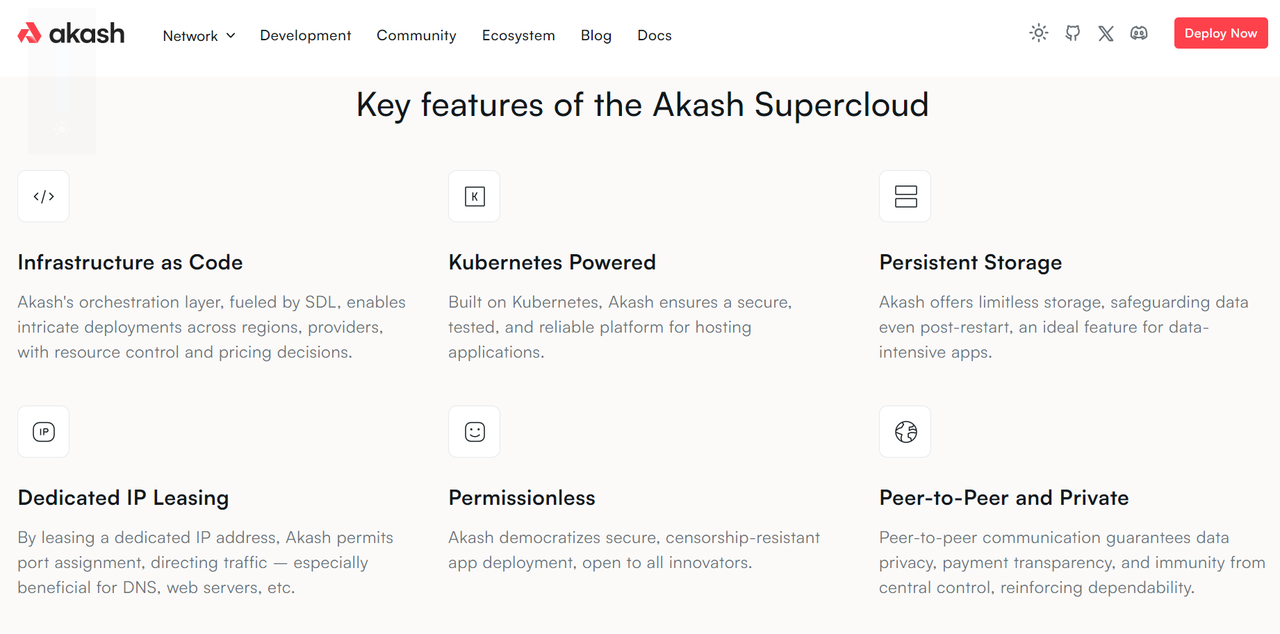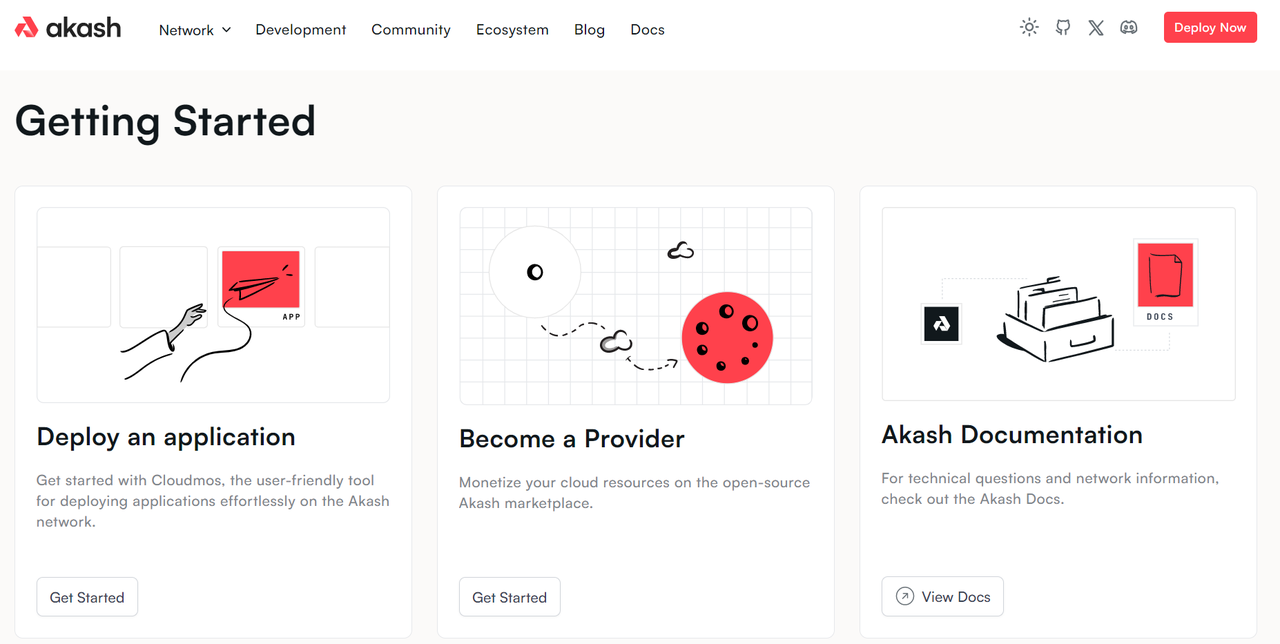Coinbase Assets announced on February 27, 2024 that Akash Network (AKT) has been included in its listing roadmap, marking significant progress for Akash in the field of distributed cloud computing.
Since successfully upgrading to Mainnet 6 in September 2023, Akash has introduced an innovation called "Supercloud," aiming to challenge the traditional centralized cloud service market by utilizing GPU resources in a decentralized manner. This upgrade not only allows users to access high-performance GPUs including Nvidia H100s and A100s, but also expands the application of GPUs to compute-intensive tasks such as artificial intelligence and data science model training.

So, what kind of project is Akash Network, which is currently in the spotlight? The following text will help you understand.
Can Akash, a decentralized cloud computing service project with a broad market and low cost, disrupt the existing industry ecosystem?
Akash Network provides a secure and efficient way of trading computing resources through an open-source supercloud platform. It leverages a reverse auction mechanism, allowing users to obtain computing resources at a much lower cost than traditional cloud services, while ensuring platform security and reliability based on technologies such as Kubernetes and Cosmos. Akash simplifies the complex deployment process across multiple suppliers using the YAML-based Stack Definition Language (SDL). The main features of Akash Network include:
Computing Market: Akash provides a unique computing market where users can deploy Docker containers on the Akash network, rent and settle resources using AKT tokens. This market, based on the Tendermint blockchain application, demonstrates the potential of decentralized cloud resource trading.
Cost-effectiveness: Compared to Amazon AWS, Google Cloud Platform (GCP), and Microsoft Azure, Akash's cost is approximately one-third of theirs, providing an economically efficient cloud computing solution.
Decentralized Advantage: Akash disrupts the market monopoly of the traditional big three cloud service providers, offering an open market that allows users to freely choose services and prices, similar to an Airbnb for cloud computing resources. It simplifies the leasing and deployment process through command-line tools, tapping into the vast market of approximately 8.4 million underutilized data centers worldwide.
Innovation in GPU Services: Akash not only demonstrates its decentralized advantage in the CPU market but also actively ventures into the GPU service domain, especially high-performance Nvidia H100 and A100 GPUs, to meet the high demand for AI and big data processing through incentive strategies and pilot proposals.
Community and Governance: Akash's open network, transparency, and community-driven governance model set it apart in the decentralized cloud computing field. Its success has attracted the attention of large machine learning companies, leading to the creation of Akash ML, aimed at promoting its adoption through convenient payment services.

Through these features, Akash Network not only provides users with an economically efficient, secure, and reliable cloud computing platform but also fundamentally challenges traditional cloud service providers, signaling the decentralized trend in the future of cloud computing.
What irreplaceable advantages does Akash Network have compared to traditional AWS cloud computing architecture?
In the field of cloud computing, Akash Network is challenging traditional industry players like Amazon AWS with its decentralized supercloud architecture. This architecture not only supports seamless migration of applications but also enables users to freely buy and sell computing resources on a decentralized network. Compared to AWS, Akash offers not only a new way to purchase computing resources but also the ability to resist censorship, protect privacy, and maintain decentralization.
Akash utilizes its native token AKT to implement a unique staking, payment, and governance mechanism, introducing USDC settlement to reduce entry barriers and improve payment convenience. Compared to AWS, Akash is set to launch its reverse auction system, allowing consumers to obtain services at a much lower cost than traditional cloud computing, typically saving up to 85% of the cost.
Greg Osuri, the advocate of Akash Network, emphasizes the advantages of decentralized cloud computing in resisting censorship and providing self-sovereignty. He points out that with the increasing centralization of the internet, a few large companies control most of the cloud computing resources, leading to censorship issues and threatening citizens' freedom. Akash's open market, through a global network of data centers, provides a more secure and auditable computing platform, which is a clear advantage for users seeking higher freedom and privacy protection.
Since its inception, Akash's growth has demonstrated the attractiveness of its model. In just six months, the platform has launched 500 active applications and completed over 30,000 deployments. Akash's decentralized features not only provide cost-effective computing resources for user services but also offer important technical foundations for decentralized control organizations.
Overall, Akash Network brings innovation and challenges to the cloud computing field through its decentralized supercloud platform. Compared to traditional cloud services like Amazon AWS, Akash not only provides significant cost advantages but, more importantly, offers a new direction for cloud computing development with resistance to censorship, high privacy protection, and decentralization.
Despite being full of potential, Akash still has many shortcomings, making its future trajectory unpredictable
As a pioneering "fully open-source supercloud" platform built on the Cosmos SDK-based proof-of-stake network, Akash Network has been pushing the boundaries of the centralized cloud computing market since 2020. Its launch of the GPU mainnet, targeting the high demand for AI training and inference, signifies Akash's deep exploration in this field.

While Akash has demonstrated significant price advantages in CPU services, it has struggled to increase its adoption rate. The slow growth of active leases on the network has exposed supply-demand imbalances. However, the introduction of GPU services seems to open up new possibilities, as the increased utilization demonstrates strong demand for high-performance GPUs.
To meet more supply and demand, Akash has taken proactive measures, including proposing challenges to increase GPU suppliers and attracting new users through concept validation models and real-time feature demonstrations. These efforts not only demonstrate its commitment to overcoming challenges but also reflect its potential significant influence in the decentralized cloud computing field.
The future of Akash Network is full of challenges and opportunities. Its successful foresight and continuous innovation in the GPU field provide strong support for long-term development in the decentralized cloud computing market. With technological advancements and market developments, whether Akash can become a key force driving the future of cloud computing is worth continuous attention.
免责声明:本文章仅代表作者个人观点,不代表本平台的立场和观点。本文章仅供信息分享,不构成对任何人的任何投资建议。用户与作者之间的任何争议,与本平台无关。如网页中刊载的文章或图片涉及侵权,请提供相关的权利证明和身份证明发送邮件到support@aicoin.com,本平台相关工作人员将会进行核查。




